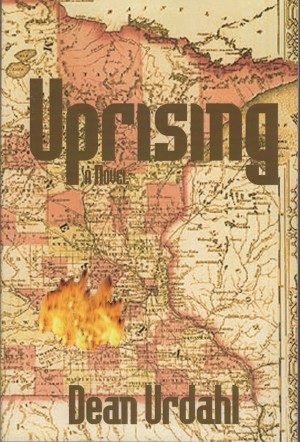
Uprising A Novel by Dean Urdahl (2007. North Star Press. ISBN 978-0-87839-247-6)
I met Representative Urdahl at Hostfest in Minot this past fall. We manned tables across from each other in the Nordic festival’s bookstore as we hawked novels to strangers, and had many occasions to talk about kids, life, writing, and the travails of self-publishing. I found that Rep. Urdahl was an engaging man, whose prior career as a teacher and high school cross country coach was evidenced by the native patience displayed during our conversations. I’m normally very leery about trading copies of my novels with other self-published authors because I’m invariably disappointed. Not so this time. Here’s why.
First, the topic of Dean’s novel is of significant interest to me. My best selling books have all been historical fiction (The Legacy, Suomalaiset, and Sukulaiset). Back a decade or so ago, I too considered researching and writing a novel about the 1862 Dakota uprising. For those of you not steeped in Minnesota history, in 1862 the Sioux, who were confined on reservations near Mankato, rose in rebellion against their white neighbors. The cause of Little Crow’s War, as the conflict came to be known, was simple: Once again, the white man failed to abide by promises made in signed treaties, most importantly, the promise to pay the Indians an annual annuity that the Sioux depended upon to feed their families. Ultimately, I chose not to write a tale set against this tragedy and, given that Urdahl has done a credible job of bringing the story to life, I am glad I yielded this topic to him.
Secondly, my prose tends to be a hybrid of contemporary and literary styles that generally works to my advantage with readers. But if an author wants to reach the wider public, a more contemporary and less literary style sells books. Here, that’s exactly what Dean Urdahl has done. His writing, while crisp and fast paced, doesn’t hold any pretense of being literary and that, as I’ve said, is a sure fire way to engage the occasional reader. If one wants to educate the general public, the style chosen by Urdahl in Uprising hits the mark and makes for an easy, though accurate and thought provoking, read.
Urdahl handles the historical portions of the narrative with an even handed, genteel approach. Yes, the Sioux were mistreated and the white traders who often cheated, lied, and mislead their Indian neighbors did stand by, their granaries full of wheat and corn, watching women and children and tribal elders perish of starvation when promised annuity payments did not arrive from the federal government. There’s no question that, once a wandering band of young Indian men encountered a farmer and his family while hunting and that confrontation ended in murder, the events that unfolded thereafter, to include the deaths of over 800 white civilians, many of whom were helpless women and children, were indeed tragic for both parties. Urdahl doesn’t excuse the conduct of the beleaguered Sioux; he explains it and provides key historical details that bring the terror of the uprising to life:
The trap door to the cellar was open and, baby and all, she slipped and fell down the stairs, stifling her cries of fear and terror and pain. Meredith gripped her child tightly and tried to shield him from the fall as she rolled down the stairs and onto the packed earthen floor .
My major criticism of the book is that the author relies upon an invented subplot involving a fictional character, Rebel soldier Nathan Thomas (aka, Nathan Cates) to carry the story arc. In Urdahl’s fictional retelling of the tale, Thomas is sent by Confederate President Jefferson Davis to Minnesota as an undercover agent to rile up the Sioux in hopes of opening up a distraction while General Lee invades Maryland. At first, this addition of a fictional plot and a created character infuriated me to the point where I wasn’t going to continue reading. But, because the author’s prose was compelling and the history was of interest, I soldiered on (pun intended). I’m glad I did. While the ending seemed a bit abrupt, and the eventual “outing” of Thomas and its attendant consequences were a tad implausible, overall, the story was well crafted, the dialogue believable, and the novel, one that I would recommend to anyone interested in this unique piece of Minnesota history.
4 stars out of 5. Not the great American novel but worth a read.
Peace.
Mark


